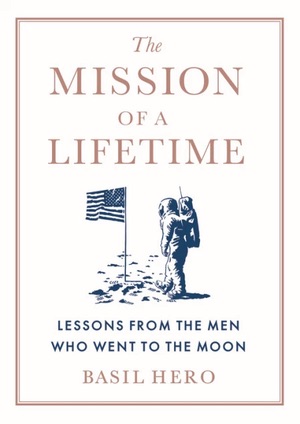Review: The Mission of a Lifetimeby Jeff Foust
|
| Their “accumulated wisdom” is divided into chapters to provide the lessons promised in the book’s subtitled. And those lessons are… well, pretty commonsense. |
The hero treatment continues to this day. In The Mission of a Lifetime, the 24 astronauts who flew to the Moon (either around it or walked on it) are called “Eagles” by the book’s author, named appropriately enough Basil Hero, putting them on an even higher pedestal than those astronauts who merely orbited the Earth. Hero (the author) decided to interview those surviving men in search of “life reflections generated by the accumulated wisdom of their emeritus years,” he describes in the book’s preface. He ultimately talked with nine of them, as well as others involved in spaceflight.
The result, though, is a little disappointing, but of no fault to the astronauts interviewed. Their “accumulated wisdom” is divided into chapters to provide the lessons promised in the book’s subtitled. And those lessons are… well, pretty commonsense. One chapter deals with how astronauts dealt with fear, particularly on their missions. The takeaway lessons include “always stay calm,” “have backup plans,” and “never give up.” Another chapter, on leadership and “doing the impossible,” includes gems like “find bold leaders” and “set a clear mission with a deadline.” Who knew?
In fact, each chapter includes those and other key lessons in a bulleted list at the beginning, making this book seem like some kind of self-help book; Chicken Soup for the Astronaut’s Soul, perhaps. One chapter deals with the stresses that the wives of the astronauts—er, Eagles—dealt with during the Apollo program, which strained and broke marriages and led in some cases to alcohol abuse and thoughts of suicide. Hero lets both the astronauts and wives talk through those issues, but that bulleted list of key lessons—including “be willing to sacrifice without resentment” and “be forgiving”—makes it unclear who should be forgiving and willing to sacrifice.
| Each chapter includes key lessons in a bulleted list at the beginning, making this book seem like some kind of self-help book; Chicken Soup for the Astronaut’s Soul, perhaps. |
While many of the book’s lessons are predictable, and don’t require going to the Moon to learn, one chapter that is a little more interesting is on future of spaceflight, particularly the role played by commercial ventures. The lessons here (“don’t be risk averse” and “trust your inventiveness and America’s entrepreneurial genius”) are less interesting than a debate about whether Blue Origin or SpaceX has the better approach. Hero, and many of the astronauts he talked to, appear to favor the former for his quiet, step-by-step approach, dismissing SpaceX and Elon Musk for trying to go too quickly and being too focused on showmanship. “Musk is a very different creature, I wouldn’t call him a salesman so much as a promoter,” Jack Schmitt says, while other astronauts decry SpaceX’s inaugural Falcon Heavy launch that launched a Tesla, with a spacesuited mannequin in the front seat, into interplanetary space. (Hero, who interviewed Jeff Bezos but not Musk for the book, doesn’t touch upon other differences, like the fact that SpaceX carried out more than 20 orbital launches last year while Blue Origin is still performing suborbital test flights.)
That contribution to the Bezos-Musk rivalry aside, perhaps the biggest lesson to be taken away from The Mission of a Lifetime is that one of the greatest accomplishments of humanity, landing humans on the Moon, can be boiled down to a pablum that doesn’t require such an extraordinary achievement to learn. A better lesson, perhaps, is that the Apollo landings were carried out by people who were extraordinary but, like all of us, imperfect, yet found a way to overcome failures, and fear of failure, to find success. You don’t have to be an Eagle to do the same.
Note: we are temporarily moderating all comments subcommitted to deal with a surge in spam.
